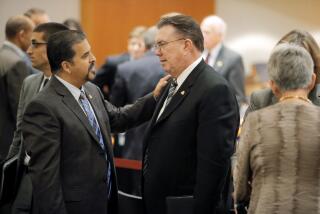Muslims Wary of White House Efforts on Faith-Based Initiative
- Share via
WASHINGTON — At a recent get-together with White House officials, Muslim leaders expected to discuss President Bush’s controversial plan to enlist churches, synagogues--and mosques--in the battle against poverty and other social ills.
Instead, the session produced yet another setback for Muslims struggling to find their place in the high-stakes game of influence in Washington. Minutes into the meeting, the Secret Service kicked out a 20-year-old congressional intern, offering no explanation.
Chagrined Muslim organizers retreated to the hallway for an impromptu shura--Arabic for mutual consultation--resulting in a walkout of the entire 29-member delegation.
“In terms of our engaging the administration, there seems to be more fluff than stuff,” laments Mahdi Bray, political advisor to the Muslim Public Affairs Council. “We have to have a serious place at the table--as opposed to being a prop for diversity.”
The Bush administration has long maintained that its vision of the religious community extends beyond the Judeo-Christian mainstream, and the president quickly apologized for the incident.
“We made it clear that the president regrets what happened,” said Scott McClellan, a White House spokesman. “We will continue to reach out to the Muslim community, as well as people from all different faiths.”
In Los Angeles, New York, Detroit and other large American cities, mosques operate programs to help battered women, shelter the homeless, feed the hungry and provide other services envisioned by architects of the faith-based initiative.
Nonetheless, Muslims remain wary about the White House initiative, a plan that has come to symbolize broader concerns about their status in American politics and society.
“The problem is how much government will control these Islamic centers and organizations,” said Zahid H. Bukhari, a scholar at the Center for Muslim-Christian Understanding at Georgetown University. Although Muslims are a growing presence on the U.S. political landscape, some question whether government officials are prepared to grant them equal footing with other religious groups and whether their efforts to aid the needy are truly welcome.
“It [the White House meeting] really rubbed salt in the wounds for American Muslims, in terms of our belief that we don’t have as much access as we should have to policy circles,” said Ibrahim Hooper, communications director for the Council on American-Islamic Relations.
As Muslims tell it, the wariness is born of slights, frustrations and ongoing reminders that many in America view them with distrust.
In March, a White House reception to celebrate Eid al-Adha, a sacred Muslim holiday, was summarily canceled. In June, Vice President Dick Cheney abruptly called off a meeting with Muslim leaders. Days later, Abdullah Al-Arian, a Duke University student from Tampa, Fla., who is an intern in the office of House Minority Whip David E. Bonior (D-Mich.), was ordered out of the meeting on the faith-based initiative.
Al-Arian is the nephew of Mazen Al-Najjar, a Palestinian who was jailed in Florida for three years after the government alleged he used an Islamic think tank as a front for terrorism. Al-Najjar was released in December after federal officials agreed there was no reason to detain him.
Muslim leaders also are concerned that Islamic groups could be discriminated against in the allocation of grant money and have urged the administration to create a panel to ensure that such decisions be made without bias. A remark by the Rev. Jerry Falwell that Islam “teaches hate,” which he later sought to modify, has left many Muslims worried that the faith-based initiative was designed for the Christian right and that their participation is of little interest.
“The concern is that people who share [Falwell’s] ideology might be close to the administration,” said Sameera Fazili, executive director of Karamah, Muslim Women Lawyers for Human Rights, based in suburban Virginia.
The tension over the faith-based initiative comes in the wake of the community’s first presidential endorsement--for Bush--last year. The then-Texas governor gained points for his inclusive rhetoric, often including mosques when he referred to congregations. In addition, Bush came out against the use of secret evidence by law enforcement, a measure that has been employed against suspected terrorists, who are sometimes Arab immigrants.
The verdict for Bush was not unanimous: Muslims of Arabic descent leaned to Bush, while a majority of African American Muslims supported Democrat Al Gore, according to pollster John Zogby.
Still, “the endorsement put the American Muslim community on the radar screen of American elections,” Bukhari said. “I think that’s a good thing.”
And as the Muslim presence grows in America--experts say the community may number several million or more--Islamic political influence also would seem likely to increase. An increasing population of African American Muslims, along with a wave of immigrants from the Middle East, South Asia and Africa, are fueling the numbers. Indeed, Muslim enclaves have become increasingly noticeable in California, New York, Illinois, New Jersey, Michigan and other places.
Yet some aspects of Muslims’ political agenda, such as U.S. policy toward Israel, can run up against those of more powerful constituencies. Activists also protest racial profiling strategies used by law enforcement at airports, where Muslim travelers may be stereotyped as possible terrorists.
On the matter of the faith-based initiative, efforts are now underway to reschedule the ill-fated session between Muslim activists and White House officials. And when it takes place, Islamic organizers promise that the door will be wide open to Al-Arian, the intern and pre-law student whose eviction stirred up the recent flap.
“We wouldn’t go without him,” said Bray. “I think we’ve demonstrated that.”
More to Read
Get the L.A. Times Politics newsletter
Deeply reported insights into legislation, politics and policy from Sacramento, Washington and beyond. In your inbox three times per week.
You may occasionally receive promotional content from the Los Angeles Times.










